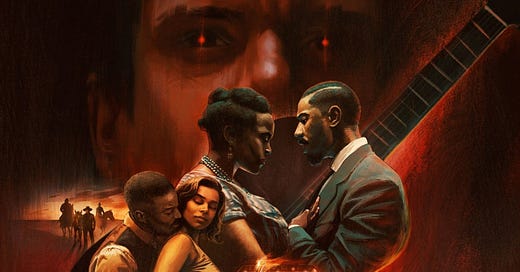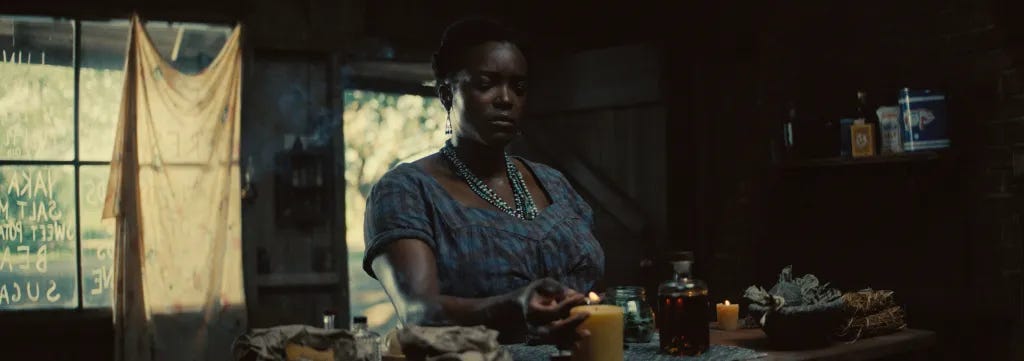The Saints Were Colonizers. The Sinners Were the Survivors.
A death doula’s call to mourn the rituals we were forced to fear.
What if the “darkness” they warned you about… was just your power, untouched by colonization?
I just watched Ryan Coogler’s Sinners and couldn’t stop thinking about that haunting baptism scene.
A vampire joining in on the Lord’s Prayer.
A moment meant to comfort fear… still soaked in the language of control.
In Sinners, the danger wasn’t the spells. It was the system that told us they were evil.
Christianity wasn’t handed to us, and many other nations, to be used against us.
And it wasn’t just us.
The Choctaw people knew what was among them, too.
They didn’t just see spirits, they understood them.
Knew the land held stories long before colonizers named it “haunted.”
Our grief was called demonic. Our dead, dangerous.
They didn’t save us. They sanitized us.
Told us to kneel, confess, forget.
But the sinners, the ones they tried to erase, always remembered.
They kept the dead close. Spoke to the land.
It wasn’t the rituals that harmed us.
It was the church pews that made us afraid of who we were.
It made me wonder:
How much of our grief has been shaped by someone else’s idea of God?
What We Were Forced to Forget
Our ancestors weren’t just praying with their hands, they were protecting with their roots.
Hoodoo. Vodou. Santería. Ifá. Brujería. Obeah. Rastafari.
These weren’t just “spooky stories” or “superstition.”
They were survival tools.
They held us when no one else did.
They were systems of healing, grief work, justice, and collective power.
But over time, we were told to fear them.
Told they were dangerous. Unholy. Backwards.
So we buried them. Colonization didn’t just take land. It took memory.
What if we remembered?
In Sinners, the power didn’t come from the pulpit. It happened in the rootworker, Annie’s cabin.
From the one who remembered.
It reminded me: the rituals they taught us to fear are often the ones that kept us alive.
That wasn’t fiction.
That maybe what we’ve called "witchcraft" was actually resistance.
And what we’ve labeled “holy” sometimes walked hand-in-hand with harm.
I don’t say this to shame faith, I say it to set it free.
To remind us that white-washed spiritual traditions are not the only valid ones.
That healing may come from remembering what we were forced to forget.
Annie’s Hoodoo gave her the knowledge no one else had—To fight what others couldn’t name. To protect her man from turning.
Questions I’m sitting with:
What rituals did they call evil just because they couldn’t control them?
How much of my grief is shaped by someone else's god?
How many generations were taught to fear their healing?
What does it mean to “rest in peace” when our peace was stolen?
What if salvation was never the goal, just submission?
Why does reclaiming my ancestors' practices still feel like rebellion?
What if the rituals that were buried, our Hoodoo, Vodou, Ifá, were the map back to ourselves? What if our ancestors never left, but we forgot how to listen?
What would happen if we stopped performing for a system built on our erasure... and started remembering what was ours before it was demonized?
I’m not here to shame your beliefs, just making room for the ones you weren’t allowed to keep. Remember the one that colonialism made you forget.
We’ve been told to reject our power, our grief, our rage. We’ve been told to “forgive,” to “move on,” to “get over it.”
But what if grief wasn’t something to cure, but something to honor?
What if the rage was sacred? What if death work wasn’t about letting go, but about reclaiming what was ours all along?
Here’s the truth: we are the sinners in this world. And the sins we carry are the chains of colonization. But the power? The power is ours to reclaim.
This isn’t about becoming something new.
It’s about unearthing what never really died.
Because maybe the real sin… was forgetting who we were before the colonizers told us how to be.





